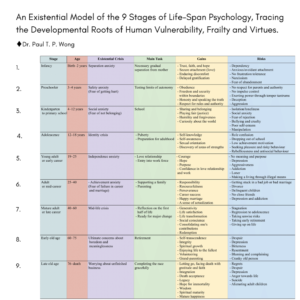Abstract
This model (Figure 1) complements Erickson’s stage model (Erikson & Erikson, 1997) by elaborating the stages of adult development (Cohen, 2005) and adding an existential dimension, which has been shown to be related to mental health in different stages of development (Adams, 2018; LeSueur, 2019). Thus, life is viewed as a constant struggle at every stage of human development. Each stage presents both an opportunity and an existential crisis; how well we navigate through the stages of life may determine to a certain extent whether we enjoy a life of virtues and flourishing, or a life of avoidable suffering from the negative consequences of the poor choices we’ve made in completing our developmental tasks (Armstrong, 2019).
Figure 1
An Existential Model of the 9 Stages of Life-Span Psychology, Tracing the Developmental Roots of Human Vulnerability, Frailty, and Virtues

Given the importance of neuroplasticity in early childhood (Harvard University, 2007; Kolb & Gibb, 2011), the seeds for both mental health and mental illness are planted in those formative years. Therefore, positive education needs to start in infancy. This proactive approach will improve parenting skills and better prepare students for a productive adulthood (Fulghum, 2004). Similarly, people in their 70s and 80s can still live happy and productive lives (Scipioni, 2020); thus, seniors can also benefit from transformative education. The present stage model will provide a useful template for mental health and flourishing in every stage of human development.
(This introduction was for the Summit on the future of postive education at the International Network on Personal Meaning’s 11th Biennial International Meaning Conference, August 6-8, 2021, Toronto, Ontario, Canada.)
References
- Adams, M. (2018). An existential approach to human development: Philosophical and therapeutic perspectives. Red Globe Press.
- Armstrong, T. (2019). The human odyssey: Navigating the twelve stages of life. Ixia Press.
- Cohen G. D . (2005). The mature mind: The positive power of the aging brain. Basic Books.
- Erikson, E. H., & Erikson, J. M. (1997). The life cycle completed: Extended version with new chapters on the ninth stage of development. W. W. Norton & Company.
- Fulghum, R. (2004). All I really need to know I learned in kindergarten: Uncommon thoughts on common things. Ballantine Books.
- Harvard University. (2007). In brief: The science of early childhood development. https://46y5eh11fhgw3ve3ytpwxt9r-wpengine.netdna-ssl.com/wp-content/uploads/2007/03/InBrief-The-Science-of-Early-Childhood-Development2.pdf
- Kolb, B., & Gibb, R. (2011). Brain plasticity and behaviour in the developing brain. Journal of the Canadian Academy of Child and Adolescent Psychiatry, 20(4), 265–276.
- LeSueur, I. (2019). An investigation of existential and positive psychological resources in college students (Publication No. 2669) [Doctoral dissertation, Seton Hall University]. Seton Hall University Dissertations and Theses.
- Scipioni, J. (2020, October 5). Why most people are happier in their 80s, according to an 86-year-old psychologist. CNBC. https://www.cnbc.com/2020/10/03/why-people-are-happier-in-their-80s-86-year-old-psychologist.html
Cite
Wong, P. T. P. (2021, August 6-8). Meaning Conference 2021 summit symposium on the future of positive education – introduction. In P. T. P. Wong (Chair), Future of positive education [Symposium]. International Network on Personal Meaning 11th Biennial International Meaning Conference, Toronto, ON, Canada.

